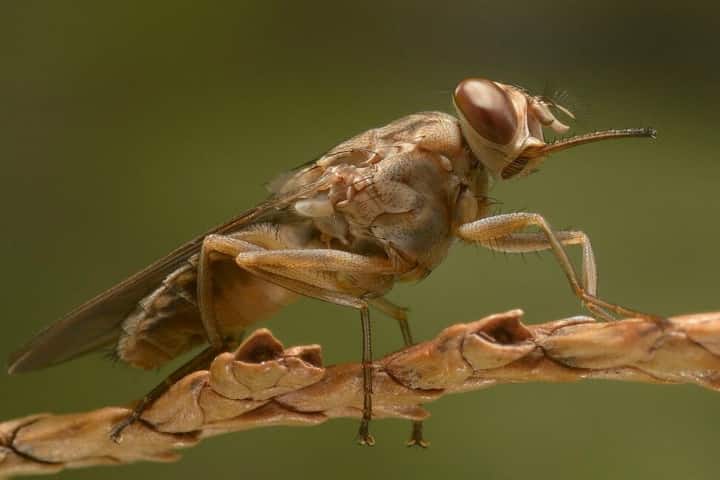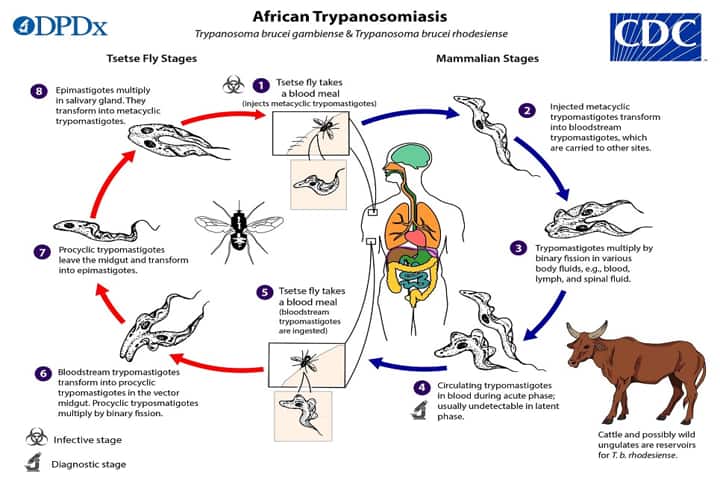

The tsetse fly is the carrier of one of the world's deadliest disease called sleeping sickness which till now had no cure (Pic. Courtesy Twitter/@Nappyblaze)
A bite from a tsetse fly – a common occurrence in sub-Saharan Africa – causes the deadly disease called sleeping sickness which is lethal and unfortunately has no treatment. The harmless bite enables the small and microscopic parasite Trypanosoma to enter the bloodstream and cause coma and death but now there is hope as a new drug which has cleared clinical trials last year can cure the patient.
As per a sciencealert.com report, the parasite which looks like ribbon and is unicellular for a long bides its time, extending to months and years, before it is quite ready to take over the seat of power, the brain.
Having invaded the brain, these parasites move to neural tissue to unleash several problems for the person. These include paranoia, changes in personality, hallucinations, confusion, sensory disturbances, convulsions and poor coordination.
In the advanced stage, patients exhibit violent behaviour too while these same people may become anguished and scream with pain by the gentle touch of water. With no treatment available, this tropical disease can result in coma and a certain death.
Worse is the disruption it causes to the sleep cycle with the patient becoming insomnia at night and sleeping excessively during day. This is what got it the name, the sleeping sickness, though the scientific title is Human African trypanosomiasis.
The new oral drug, a marvel of development in science and medicine can provide succour to these hundreds of sufferers in Africa each year. What makes it even better is that it needs to be taken only once and is 95 per cent effective in curing the person. It will also curb the outbreak of epidemics that took place in the 1920s, 70s, 80s and 90s, claiming thousands of lives each time.


While the World Health Organisation wants to wipe out the disease by 2030, it seems a tough call. Talking to NPR, Jacques Pepin, an infectious disease specialist said: “When you’re trying to eradicate a disease, it’s always the last few miles that are difficult. It’s very hard to reach the magical number of zero cases.”
As sleeping sickness affects a small number in the world, pharma companies are not keen to do research and development for better medicines. WHO has been trying to change this and the new oral drug seems to be a big step in this direction.
While being aware of the disease, the researchers are not sure as to how the parasite attacks the brain. There are two subspecies of Trypanosoma in Africa and it is the T. brucei gambiense in the Democratic Republic of Congo that causes the majority of the cases.
This variety breaks the blood-brain barrier – a defensive wall which enables to keep pathogens and toxins out of the central nervous system. Yet, some studies state that the parasite crosses the blood-cerebrospinal border – that keeps the fluid that bathes the brain and spinal cord separate from blood-infused tissue.
Once in, targeting the parasite is next to impossible. Earlier, doctors used arsenic to kill the parasite but in the process some patients died. Other methods were tried but invariably between 30 to 50 per cent cases relapsed.
Taiwan plans to ask its diplomatic partners and friendly nations to bring up China's unilateral…
Google has rolled out AI Mode feature for all users in India, which will make…
71-year-old physician and veteran lawmaker Jennifer Geerlings-Simons has been elected as Suriname's first female president,…
Taiwan's Ministry of National Defense detected four Chinese naval vessels operating around its territorial waters…
India abstained from voting on the United Nations General Assembly (UNGA) resolution on the situation…
By Shalini Bhardwaj A government-appointed expert committee in Karnataka has found no evidence linking COVID-19…